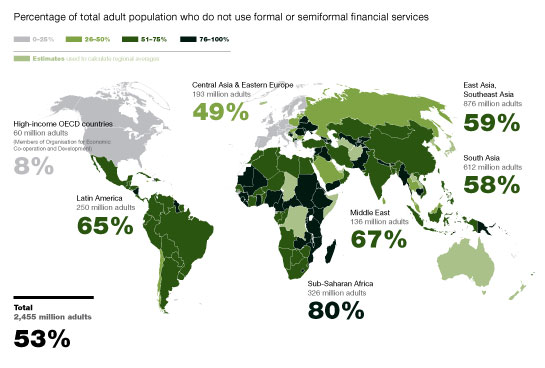In the dynamic digital landscape of our 21st century, contactless payments, public transport cards, and mobile money transactions are swiftly becoming the norm. Yet, starkly juxtaposed against this modern backdrop, millions of households worldwide still remain without any form of banking service.
Blockchain based digital identity verification solutions have the potential to greatly expand economic opportunities for the world’s poor.
Banking the Unbanked
According to the World Bank, 2 billion people do not have access to financial services, and 850 millions even lacking essential documentation like a government-issued ID required to open an account. Some face bureaucratic hurdles, for many, the fees attached to banking services are beyond their financial reach. Yet, for others, the physical absence of bank branches or ATMs in rural areas further exacerbates their unbanked dilemma.
The ramifications of being unbanked stretch beyond mere inconvenience. Those deprived of traditional banking services frequently find it harder to obtain credit, thereby obstructing their ambitions to initiate or grow a business. Routine tasks such as bill payments or access to welfare support from the government tend to become painstakingly difficult. Moreover, poorly banked or unbanked people stand at an increased risk of falling prey to fraudulent activity.
According to a report by the World Bank merely 76% of the global populace possess a bank account, thus leaving over billions of people stranded in the unbanked class.
Unbanked Population Country Gaps
From one nation to another, the gap between the banked and unbanked sways drastically. For instance, a mere 45% of adults in Nigeria have access to a bank account, while the figure rests at 53% and 60% for Bangladesh and Colombia respectively. On the contrary, the United States sees a minuscule 4.5% of unbanked adults. Nevertheless, this seemingly small percentage amounts to roughly 6 million households.

Source: McKinsey I Counting the world’s unbanked
There are many reasons why an adult may be unbanked, devoid of a basic privilege, a gateway to a myriad of opportunities and crucial services. Unbanked individuals can find themselves cut off from earning opportunities and access to essential services. People may be unbanked due to poverty and practical considerations, such as rural communities lacking access to financial institutions, but a major reason is the inability of some people to verify their identity.
Digital Identity and Blockchain Technology
The challenges facing unbanked and unidentified individuals are particularly stark in modern society, due to their lack of access to essential financial and other services that require official identification. These challenges are exacerbated in the digital age, where more and more services require online verification.
Blockchain-based digital identity management unveils a new solution to these pressing challenges. By introducing a steadfast, secure method for the creation and verification of digital identities, blockchain stands poised to bridge this chasm, offering a lifeline to the unbanked and unidentified masses.
This technology ensures that the data is incorruptible, secure, and easily accessible at any time. It allows for the creation of a ‘self-sovereign identity’: a digital identity that is not dependent on any centralized authority and that cannot be taken away or manipulated by any third party. This is especially useful for individuals in countries with weak or corrupt institutions.
Consider the potential impact on micro-loans. Through blockchain identity verification, lenders can ascertain the identity of borrowers, minimizing fraud risks. This paves the way for unbanked individuals to access micro-loans, providing an opportunity to establish or expand their business ventures.
Access to online work is another area where blockchain identity verification could make a significant impact. Today, identity theft is a real concern. However, by using blockchain-based verification procedures, online work opportunities become more accessible, opening up new streams of income for the unbanked.
Blockchain-based digital identities are cheaper and more efficient than traditional methods of identity verification, for they do not require a physical identity card and can be obtained remotely. This is of particular importance for those living in rural or remote areas, who may have difficulty accessing government services. And imagine the tremendous advantage in the context of government services. Blockchain online identity verification can make these services accessible to all, especially those in remote regions or those lacking traditional identification.
The Bottom Line
Blockchain digital identity could be key to building a bridge for the unbanked and unidentified by enabling easier access to a myriad of essential services in our increasingly digital global landscape, eventually driving towards greater inclusion and empowerment for all.

